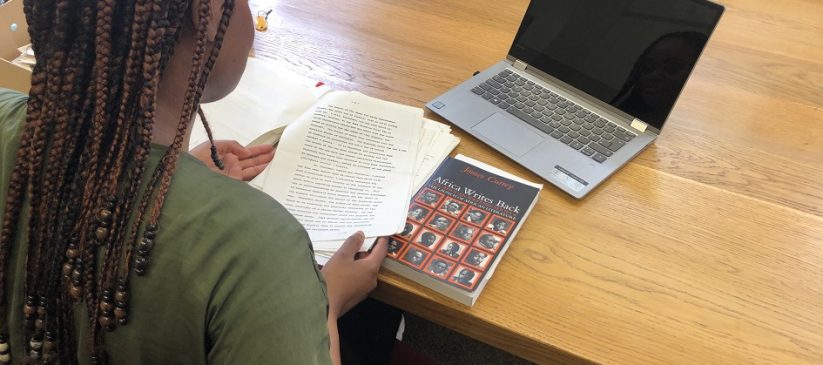Finding the Biafran Civil War in the African Writers Series (1/3)

This is the first of three posts in a series written by Temiloluwa Odugbesan, who completed a UROP placement at the University of Reading Special Collections in the summer of 2021.
My name is Temiloluwa, and I am studying Spanish and Economics at the University of Reading. I have just completed my first week working as a researcher on a UROP project. I am researching with the Literature and Languages school, so I have had the pleasure of meeting my supervisor, Dr Sue Walsh and the Principal Archivist, Caroline Gould, as well as other members of staff within the reading room in Special Collections. The reading room is located in the same building as The Museum of English Rural Life near the London Road Campus.
The purpose of my internship is to trace back references relating to the Biafran Civil War in the African Writers Series published by Heinemann. The African Writers Series is essentially a series of books produced by African writers that were then published by Heinemann Educational Books from 1962 to 1994 which have been owned by Pearson since 2011. Many of these books have been taught in African, British and American schools as a part of the curriculum.
This is a picture of me in the reading room at Special Collections, looking at one of the files of material on the African Writers Series.

One example of the kind of material I have been looking at are letters between the publishers and the Nigerian woman writer Flora Nwapa. Flora Nwapa is the first woman novelist to be published in the Heinemann series. Her first novel, Efuru, is about the woman on the front cover making it through the world and dealing with marriage, divorce, moving away from home and infertility. Despite her challenges Efuru finds her purpose and is offered wealth and beauty from the Goddess of the lake, Uhamiri.
It is important to note this book by Flora Nwapa circulated in Nigeria just before the start of the civil war in 1966. This is the year when rising tensions between ethnic groups were brewing and some say as a result of those tensions the civil war was inevitable.
Furthermore, in the letters between Nwapa and her publisher about her second novel Idu, that the production and dispersion of African literature became challenging or delayed during the conflict which started in July 1967. But as well as these letters, there’s also evidence of things getting back to normal after the war because there’s also a copy of a programme for a dramatization of Efuru which was put on after the civil war had ended.
This is the type of material I will continue to seek out in my research into the correspondence dating back to the Nigerian-Biafran Civil War in 1967 – 1970. The Special Collections team have very kindly catalogued a lot of Heinemann’s correspondence with their authors and henceforth, I look forward to taking my time to read and examine such material in order to see if there are any further references to the civil war to be found.
My experience so far is that it took the first week to adjust and settle in. This is because when handling the archival files, it is different to any work I have previously done. Unlike the construction of an essay, the archival files are primary materials which are much more plentiful, so the focus is on constructing and narrating a story around what is both tangible and relevant to the study. I found that through sifting and sorting and taking time with the material I then began to truly understand and simultaneously learn how best to work through the archival material that is relevant to the war. This is because sometimes the content related can be implicit or on the other hand, it is distracting in the sense that you find something so interesting you have the potential of losing focus on the initial objective. However, my supervisor, Sue; the Principal Archivist, Caroline, and the Special Collections reading room staff have all been incredibly welcoming and briefed me on how best to work and make the most out of researching in the archives. The best way is to make a note of key material, photograph with permission and revise this content in correlation to the research objective.
Through following this advice, I look forward to research over the coming weeks.
See you at the next blog!
N.B. You can see some of the material I refer to above in the following Heinemann Educational Books archival files:
HEB 04/01: Here you can find the programme of play adapted from Flora Nwapa’s novel Efuru, presented 28 Jan 1971. (You can see this file’s record in our database here)
HEB 04/06: Here check out Flora Nwapa’s letter from Flora Nwapa to Keith Sambrook, 8 Sept 1967. (You can see this file’s record in our database here)